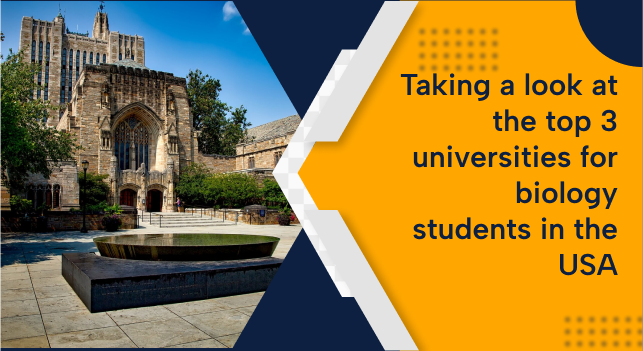Taking a look at the top 3 universities for biology students in the USA
In the United States, several universities stand out for their exceptional programs in biology, offering students comprehensive academic experiences, cutting-edge research opportunities, and access to renowned faculty. The top three universities for biology students in the USA—Massachusetts Institute of Technology (MIT), Stanford University, and Harvard University—are recognized for their excellence in biological sciences education, research impact, and contributions to advancing scientific knowledge. Let’s explore what makes these universities leaders in biology education:
1. Massachusetts Institute of Technology (MIT)
Leadership in Biological Sciences: Massachusetts Institute of Technology (MIT), located in Cambridge, Massachusetts, is renowned for its leadership in science, engineering, and technology. The Department of Biology at MIT is a hub of scientific innovation and discovery, offering rigorous academic programs and research opportunities at the forefront of biological sciences.
Interdisciplinary Approach and Collaborative Research: MIT emphasizes interdisciplinary collaboration and encourages students to explore diverse fields within biology, including molecular biology, genetics, neuroscience, bioinformatics, and environmental biology. The university’s strong ties with other departments and research centers facilitate collaborative projects that tackle complex biological questions.
Cutting-Edge Research Facilities: MIT provides state-of-the-art research facilities, laboratories, and equipment that support groundbreaking research in biological sciences. Faculty members and students engage in research that spans from basic science to applied research, addressing global challenges in health, sustainability, and biotechnology.
Undergraduate Research Opportunities: MIT offers extensive opportunities for undergraduate research, allowing students to work alongside faculty members and participate in hands-on research projects from their freshman year. These experiences help students develop critical thinking skills, laboratory techniques, and a deep understanding of scientific inquiry.
Integration of Technology and Innovation: MIT integrates technology and innovation into its biology programs, leveraging advancements in computational biology, bioengineering, and biotechnology. Students have access to cutting-edge tools and methodologies that enhance their research capabilities and prepare them for careers in academia, industry, or research institutions.
2. Stanford University
Excellence in Biological Sciences Education: Stanford University, located in Stanford, California, is renowned for its excellence in biological sciences education and research. The university’s Department of Biology offers a comprehensive curriculum that covers diverse areas of biology, from cellular and molecular biology to ecology, evolution, and bioinformatics.
Faculty Expertise and Research Impact: Stanford’s biology faculty are leaders in their fields, conducting influential research that advances scientific knowledge and addresses pressing global challenges. Faculty members engage students in cutting-edge research projects, providing mentorship and guidance that shape students’ academic and professional development.
Interdisciplinary Research Centers and Institutes: Stanford houses interdisciplinary research centers and institutes that foster collaboration across departments and disciplines. These centers focus on areas such as genomics, neuroscience, bioengineering, and environmental science, providing students with opportunities to explore specialized fields within biology.
Field Research and Global Engagement: Stanford encourages field research and global engagement in biological sciences, offering opportunities for students to conduct research in diverse ecosystems and communities worldwide. The university’s global partnerships and research initiatives contribute to understanding biodiversity, conservation biology, and ecosystem health.
Innovation and Entrepreneurship in Biology: Stanford promotes innovation and entrepreneurship in biology through programs that support technology transfer, startup ventures, and commercialization of research discoveries. Students have access to resources that foster creativity and collaboration, preparing them to translate scientific discoveries into real-world applications.
3. Harvard University
Diverse and Comprehensive Biology Programs: Harvard University, located in Cambridge, Massachusetts, offers diverse and comprehensive biology programs through its Department of Molecular and Cellular Biology and other affiliated departments. Harvard’s biology curriculum covers fundamental principles of biology, genetics, developmental biology, and evolutionary biology.
Faculty Excellence and Research Impact: Harvard’s biology faculty are world-renowned scholars and researchers who lead pioneering studies in genetics, immunology, stem cell biology, and other fields. The university’s commitment to research excellence and interdisciplinary collaboration enriches students’ educational experiences and broadens their perspectives.
Research Opportunities and Facilities: Harvard provides extensive research opportunities for biology students, including access to state-of-the-art laboratories, research centers, and field stations. Students can engage in independent research projects, collaborate with faculty on groundbreaking studies, and contribute to scientific publications.
Integration of Biology with Other Disciplines: Harvard encourages the integration of biology with other disciplines such as physics, chemistry, computer science, and engineering. The university’s interdisciplinary approach fosters innovative research at the interface of biology and technology, addressing complex biological questions and societal challenges.
Global Impact and Leadership in Biological Sciences: Harvard’s leadership in biological sciences is evidenced by its global impact on scientific research, education, and policy. The university’s graduates are influential leaders in academia, industry, healthcare, and government, driving advancements in medicine, biotechnology, and environmental conservation.
Conclusion
Massachusetts Institute of Technology (MIT), Stanford University, and Harvard University stand at the forefront of biology education and research in the USA, each offering unique strengths and opportunities for students pursuing careers in biological sciences. These universities provide rigorous academic programs, extensive research opportunities, access to world-class faculty, and state-of-the-art facilities that prepare students to tackle complex biological challenges and contribute to scientific innovation. Aspiring biology students can choose from these esteemed institutions based on their academic interests, career goals, and desire to make a meaningful impact on the future of biological.









